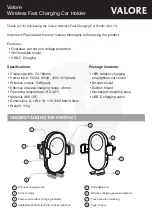
Section 20
136
Knowing Performance and Safety Guidelines
Using Your Phone Near Other Electronic Devices
Most modern electronic equipment is shielded from radio frequency (RF) signals.
However, RF signals from wireless phones may affect inadequately shielded electronic
equipment.
RF signals may affect improperly installed or inadequately shielded electronic
operating and entertainment systems in motor vehicles. Check with the
manufacturer or its representative to determine if these systems are adequately
shielded from external RF signals. Also check with the manufacturer regarding any
equipment that has been added to your vehicle.
Consult the manufacturer of any personal medical devices, such as pacemakers and
hearing aids, to determine if they are adequately shielded from external RF signals.
Note:
Always turn off the phone in health care facilities and request permission before
using the phone near medical equipment.
Turning Off Your Phone Before Flying
Turn off your phone before boarding any aircraft. To prevent possible interference
with aircraft systems, the U.S. Federal Aviation Administration (FAA) regulations
require you to have permission from a crew member to use your phone while the
plane is on the ground. To prevent any risk of interference, FCC regulations prohibit
using your phone while the plane is in the air.
Turning Off Your Phone in Dangerous Areas
To avoid interfering with blasting operations, turn off your phone when in a blasting
area or in other areas with signs indicating that two-way radios should be turned off.
Construction crews often use remote-control RF devices to set off explosives.
Turn off your phone when you’re in any area that has a potentially explosive
atmosphere. Although it’s rare, your phone or its accessories could generate sparks.
Sparks could cause an explosion or a fire resulting in bodily injury or even death.
These areas are often, but not always, clearly marked. They include:
䊳
Fueling areas such as gas stations
䊳
Below deck on boats
䊳
Fuel or chemical transfer or storage facilities
䊳
Areas where the air contains chemicals or particles such as grain, dust or metal
powders
䊳
Any other area where you would normally be advised to turn off your vehicle
engine
Note:
Never transport or store flammable gas, liquid or explosives in the compartment of
your vehicle that contains your phone or accessories.
Restricting Children’s Access to Your Phone
Your Sprint PCS Phone is not a toy. Children should not be allowed to play with it
because they could hurt themselves and others, damage the phone or make calls that
increase your phone bill.
Summary of Contents for LM460
Page 1: ...Sprint PCS The clear alternative to cellular SM...
Page 4: ......
Page 10: ......
Page 20: ...Section 2 20 Getting to Know Your Sprint PCS Phone Front View of Phone...
Page 32: ...Section 3 32 Understanding Roaming...
Page 44: ...Section 4 44 Making and Answering Calls...
Page 54: ...Section 5 54 Navigating Through Menus and Entering Text...
Page 60: ...Section 7 60 Using Sprint PCS Service Features...
Page 72: ...Section 9 72 Managing Messaging...
Page 78: ...Section 10 78 Using Your Internal Phone Book...
Page 88: ...Section 11 88 Changing Your Phone s Settings...
Page 104: ...Section 14 104 Using the Voice Services of Your Sprint PCS Phone...
Page 124: ...Section 16 124 Games...
Page 132: ...Section 19 132 Selecting Your Accessories...
Page 140: ...Section 20 140 Knowing Performance and Safety Guidelines...
Page 154: ...Section 21 154 Terms and Conditions Warranty Information...
















































